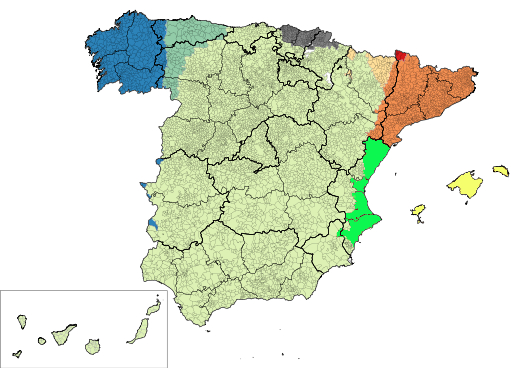Why speak Spanish in Spain?
Language imposition for Spanish?
December 17, 2023
Article 3.1 of the Spanish Constitution reads: „Castilian is the official Spanish language of the State. All Spaniards have the duty to know it and the right to use it.“ (Castilian = Spanish) This would mean that a minimum proportion of lessons must be taught in Spanish, even in the regions with a regional language.
One concern is that the demand that parents should have the right to choose the language of instruction for their children is too radical if it means that children in these regions will no longer learn Spanish. One critic wrote: „It is unacceptable that there are pupils who complete their entire schooling exclusively in Valencian, Galician or Basque, as a lack of knowledge of the common language of Spain, namely Spanish, jeopardizes the future existence of the country, i.e. Spain,“ and refers to the constitutional article quoted above.
First of all, the demand that parents should decide on the language of instruction refers to the language in which the children should learn. This includes 50/50 as well as 100% in only one language, which does not exclude the teaching of other languages such as Spanish, English, French, etc. The question remains as to how to deal with Spanish as a „foreign“ language in Spain, not only in view of the Spanish constitution, but also in view of the realities.
Learning in your mother tongue
I would first like to refer to UNESCO, “the United Nations Educational, Scientific, Cultural and Communication Organization“, which explains quite well “Why mother language-based education is essential“.
Schools in Catalonia teach in Catalan, they call it immersion. One result can be seen in the latest PISA study: “...the Autonomous Community of Madrid has improved the most and the Community of Catalonia has deteriorated the most,“ states the teachers' union AMES.
I would like to add from my own experience. All my grandchildren who learned arithmetic in Spanish cannot do mental arithmetic in German. Spaniards like the English say numbers in the order in which they are written as digits, i.e. forty one, whereas we Germans do it the other way round and say one and forty. This is confusing because it is logical to mention the tens first and then the ones. As soon as we get into the area of numbers over 100, we Germans> do it the same way, we start with the hundreds, thousands etc.
For anyone who is not French, I recommend trying to do the math in French. 78+97 would be sixty-ten-eight plus four-twenty-ten-seven. Have fun! Native French speakers can do it.
Spanish as a compulsory subject in the regions with a regional language
Of course, it is right to offer Spanish as a compulsory first „foreign“ language to pupils with 100% regional language as the language of instruction. Foreign language is not the right term here, because Spanish is not foreign here, but is generally spoken by the majority.
The forced learning of a foreign language often has the side effect that this happens reluctantly and inadequately. “Officially, until the end of the GDR and officially, all pupils were free to opt out of Russian after the fall of the Wall and the implied school reform. I can't say how many took advantage of this.“ announces an East German on gutefrage.net (goodquestion.net) and in 2022, Der Spiegel reports: “In the GDR (former East Germany), Russian was still a compulsory subject. Today, this foreign language is being taught less and less in German schools.“ Quite a few former East Germans only learned what was absolutely necessary and did everything they could to forget Russian again. The mental connection with the regime dependent on the Soviet Union was probably too strong.
Is it therefore justified to argue that being forced to learn Spanish as a „foreign“ language does not necessarily enable citizens to participate in the democratic decision-making process for the whole of Spain in a fully informed manner? I would hazard a guess that this lack of information also applies to a large proportion of native Spanish speakers who, after working overtime, shopping and looking after children and the household, simply don't find the time and tend to seek relaxation outside of politics.
Instead of compulsion, there is also a positive way to encourage language learning: Attraction, incentive or positive motivation.
How attractive is Spanish?
I have traveled through Galicia and Catalonia and I am referring to my home province, which has been Valencia for 25 years. I only find regional language everywhere, on all the signs and official communications. Spanish no longer seems to exist. My home town of Jávea is an exception. Signage here is bilingual, so to speak. Everything that is positive, such as „Zona Verda“ for green zone, appears in Valenciano, everything that has a negative connotation, such as a ban, appears in Spanish. For me, this is a pschylogical mockery of native Spanish speakers.
Spanish place names are not only disappearing from place name signs, but also from Spanish-language documents and websites. The organization „Hablamos Español“ has recently documented this in the book „El robo de los nombres de nuestros pueblos„“ (to order here), (translated: „The robbery of the names of our towns“). On page 11, it is noted that under the government of the conservative Spanish President Aznar, La Coruña, a Galician city with around 250,000 inhabitants, was robbed of its Spanish name on March 4, 1998. It is as if the weather map on the news program had been replaced by „Mùnich“ instead of München and the place of residence on the identity card Köln had been replaced by „Cologne“.
Even the Spanish parliament no longer communicates in the common language. Madrid is not in a position to protect the rights of native Spanish speakers throughout Spain. Alberto Núñez Feijóo is President of the Spanish region of Galicia. There is a language constraint for Galician that is equivalent to the language constraint for Catalan in Catalonia. The conservative PP has even made this linguistic hypocrite its presidential candidate for the whole of Spain. Is it any wonder that these circumstances lead to contempt for a language when its speakers allow themselves to be intellectually deprived in this way?
There are plenty of reasons and opportunities to present Spanish as an attractive language.
Spanish allows Spaniards to communicate with their neighbors in other regions. Catalans who understand more than three Basque words can probably be counted on one hand. Many separatists suggest that English could be used instead of Spanish, as it is, after all, a world language. Well, so is Spanish. Apart from Basque, all languages in Spain are of Latin origin, making it easier to learn and understand for everyone. It will also help if all publications, documents and street signs are bilingual.
Apart from the global importance of Spanish. In the USA, Spanish place names have remained untouched almost everywhere for centuries and musicians create sympathy and affection for the Spanish language with Spanish lyrics in English-language songs. What would be possible for Spanish artists with a little political support in Spain?
| | | | Click here to subscribe or cancel your subscription |
Myths and deceptions of Catalan nationalism

Here you'll find the translation
Languages in Spain
Spanish, Basque, Catalan, Mallorquin, Valenciano etc.
The strategy of recatalanization
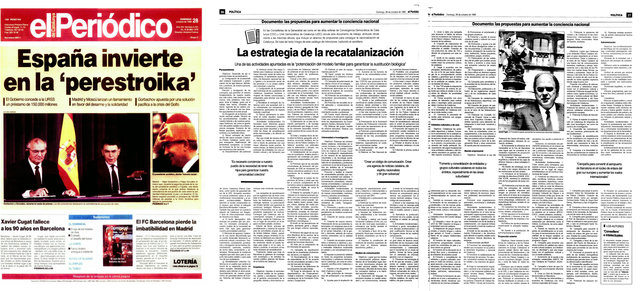 1980 the Spanish journal "El Periodico" published a secret document about the strategy of the Catalan government. It shows in a frightening way the actual spiritual world of the separatist leaders.
1980 the Spanish journal "El Periodico" published a secret document about the strategy of the Catalan government. It shows in a frightening way the actual spiritual world of the separatist leaders.Now it is available in english translation.
Pancatalanism
the separatist's imperial claim
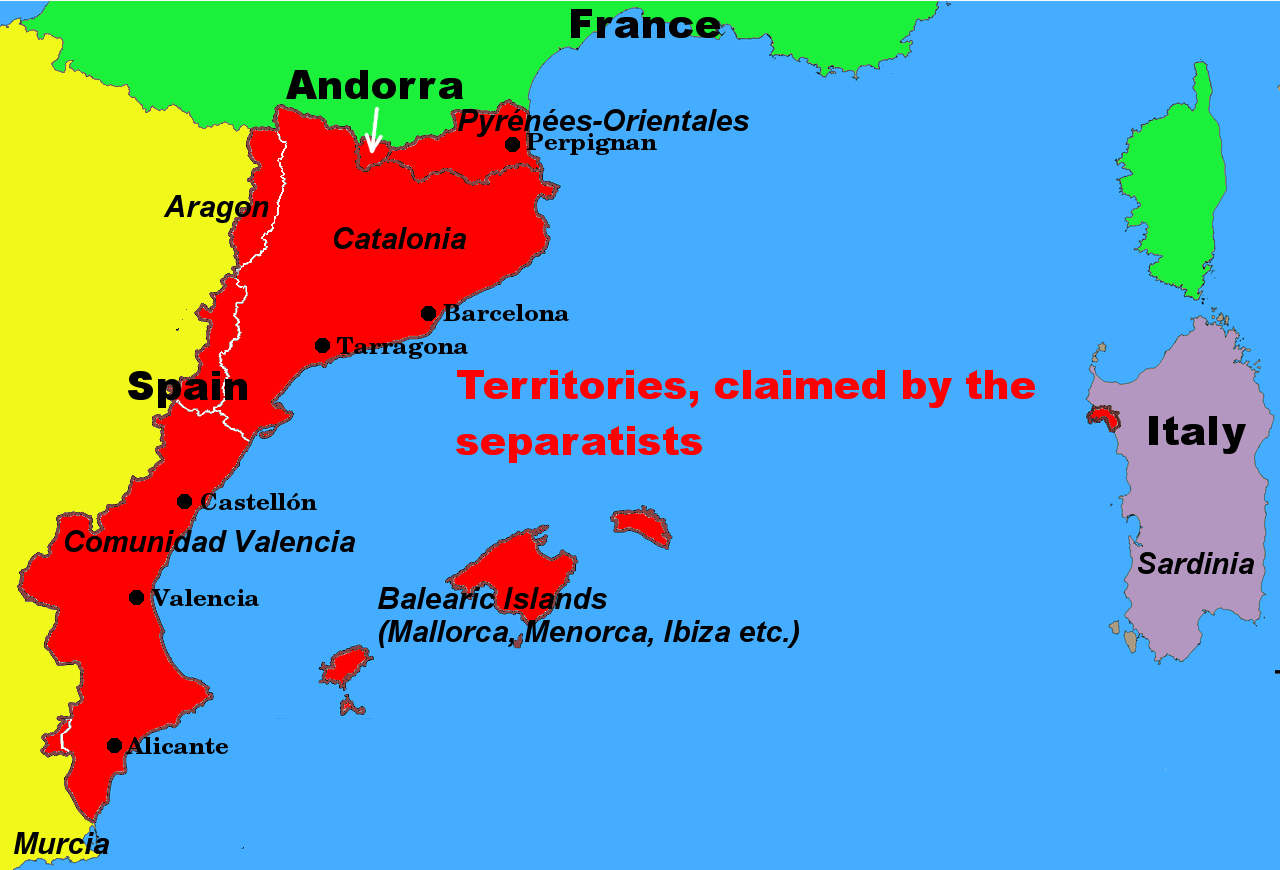 The Catalan government exports the conflict into communities with Catalan population, supporting all efforts of the separatists including financial means to destroy Spain.
The Catalan government exports the conflict into communities with Catalan population, supporting all efforts of the separatists including financial means to destroy Spain. An important tool is the establishment of a language dictatorship that is not afraid to use the same means as Franco.
Separatist indoctrination

Click here to read the study
Language imposition and democracy
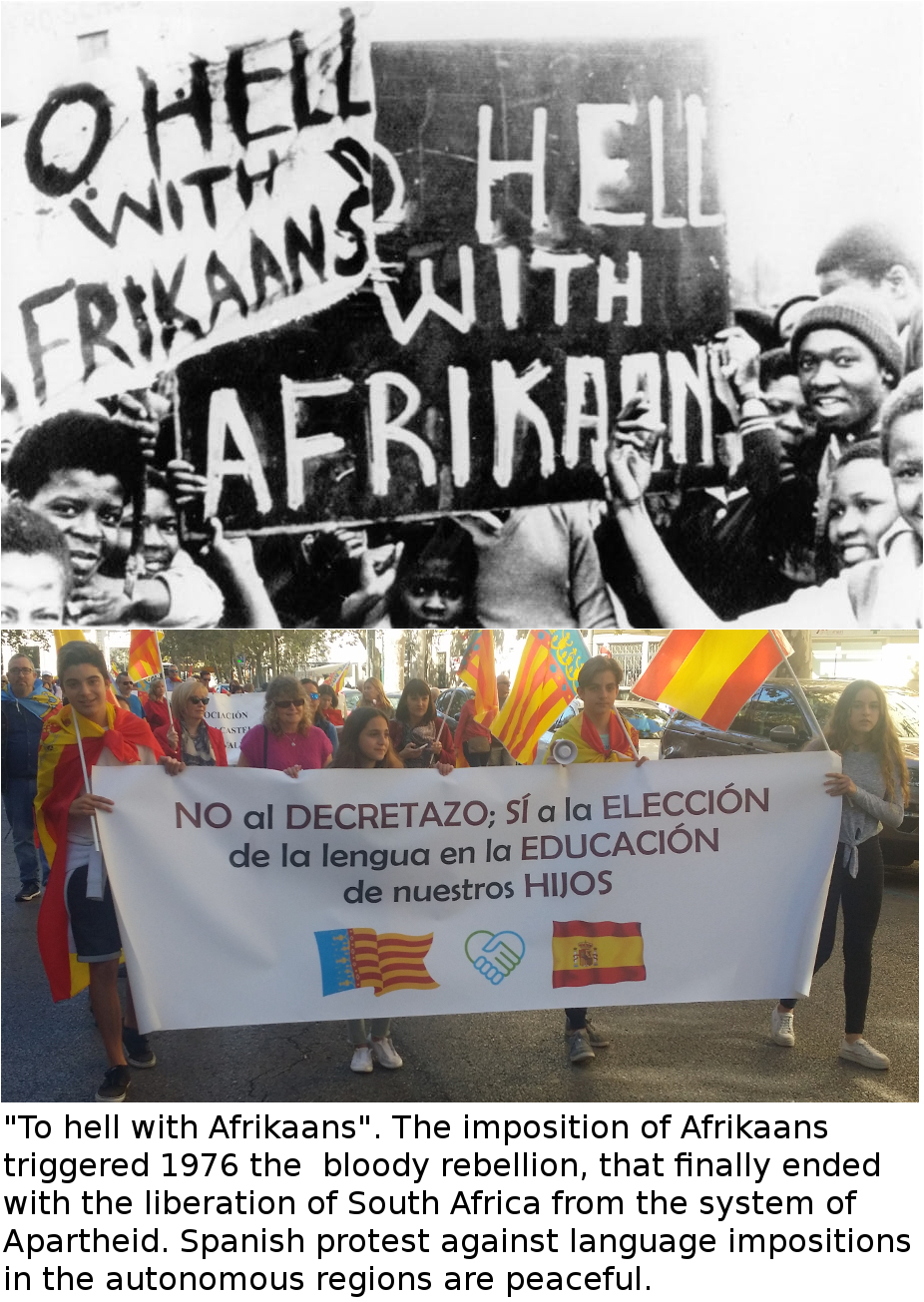
An essay in 6 parts on the potentially violent effect of language imposition containing contributions from South Africa, Catalonia, Ukraine and France.
go to part 1 SticSti
Publications
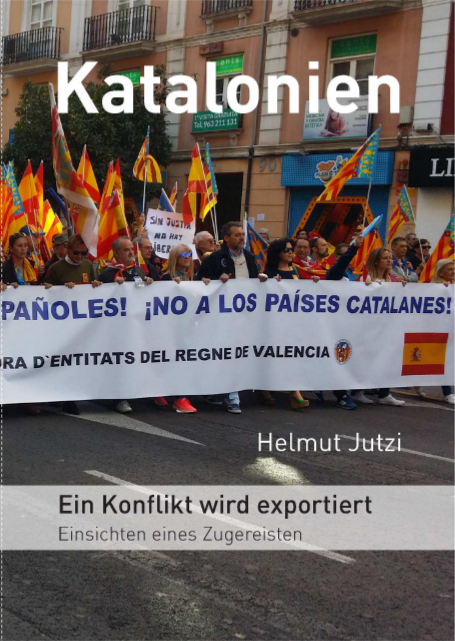 The title says: "Catalonia, a conflict is exported. Insights of a migrant"
The title says: "Catalonia, a conflict is exported. Insights of a migrant"Sorry, up to now, this book is only available in German. However, drop us a line, if you are interested to learn more Contact.

